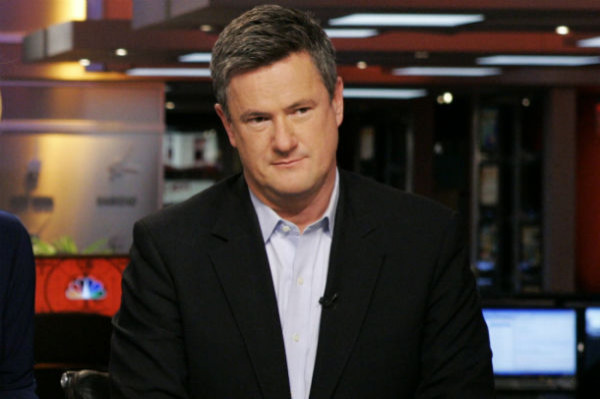Joe Scarborough Book Aims To Inspire Republicans, Knock Down Tea Party Extremists

Joe Scarborough, the former Congressman turned popular TV personality, is often mentioned as a possible presidential candidate on the Republican ticket in 2016. Though he keeps denying any interest in a run for the White House, most recently tweeting that he’d rather be picked up by the Red Sox next spring, his new book will start tongues wagging again.
I'm hoping to be picked up by the Sox next spring! RT @ChrisPlanet1: @JoeNBC Any thoughts of getting back in the game Joe? #Scarborough2016
- Joe Scarborough (@JoeNBC) October 9, 2013
Titled “The Right Path: From Ike To Reagan, How Republicans Once Mastered Politics -- And Can Win Again,” the book is a manifesto, intended to motivate and inspire Scarborough’s fellow Republicans. And if he’s not trying to lay the groundwork for a presidential run, he clearly intends to wield influence as a respected pundit. Already, it’s been compared to Barry Goldwater’s iconic “The Conscience of a Conservative” and praised by influential conservatives like Bill Kristol, who blurbed, “If you’re interested in the Republican future, you need to read ‘The Right Path.’” The party’s current infighting and exile from the White House and Scarborough’s own anguish over how Tea Party extremists have pushed the GOP so far to the right that it has trouble building a majority powerful enough to win back the presidency prompted him to write the book.
Looking back over four decades, most of “The Right Path” focuses on Republican presidents who knew how to do it right -- win elections, wield power and shape the direction of the country -- by balancing their principles with pragmatism. Scarborough draws a sharp contrast between those golden years and the party’s current predicament. He thinks it’s very likely that the Democrats will continue to control the White House until 2024 (with Hillary Clinton sitting in the Oval Office) while “all too often these days it’s the Republicans who sound angry, extreme, and too out of touch.”
Scarborough continues:
“If the GOP wants to regain its place as the decisive force in national politics, it needs to reengage with its real legacy, which is one of principled conservatism combined with clear-eyed pragmatism. We Republicans have been at our best when we are true to one of the deepest insights of conservatism: that politics, like mankind itself, isn’t perfectible in a fallen universe. And if we continue to let the perfect become the enemy of the good, then we will continue to dwindle in influence.”
The party’s “continued march toward obsolescence” could cost them more than just the White House, he writes, but also tilt the Supreme Court in a liberal direction on issues like abortion, health care, guns and federalism. Taking an unambiguous shot at Tea Party leaders like Ted Cruz and Michele Bachmann, he writes, “Those who would move the party so far right on social issues that their nominated candidates become unelectable are, to borrow an infamous phrase from the Vietnam War, 'destroying the village to save it.'”
He blames conservative media from Rush Limbaugh clones to Ann Coulter (“trashing liberals as traitors”) and other authors who help trap Republicans in a media bubble that insulates them from opposing viewpoints -- and reality. Too often, they get their news from what he calls the “Conservative Entertainment Complex,” a “perpetual right-wing resentment machine” that hurt the party’s chances in the 2012 campaign, deluding Mitt Romney into thinking “he would defeat Barack Obama well into the election night.” That echo chamber helped create a brutal environment, in which anyone who expressed concern about Romney’s ineptitude was immediately attacked as a traitor to the party.
But Scarborough is optimistic that the party can change its course and start winning elections and he turns to his own political career as an example of how to do it. He admits that he was more of an ideologue than a pragmatist in his first few years in Congress in the mid-1990s, taking on GOP moderates as much as liberal Democrats. During that time, Scarborough opposed the idea of Colin Powell running for president because he was too moderate. But a few years later, he changed his mind, realizing that Powell might have been able to unseat Bill Clinton “if I had not let my hopes for a conservative stalwart get in the way of our best hope to beat Clinton while making history.” He goes on to praise Powell as a classic conservative with a belief in free enterprise, education reform and realist foreign policy.
He concludes:
If the Republican Party is big enough to reach out to disaffected moderates like Colin Powell, then it will be big enough to win the White House in 2016, even if Hillary Clinton is the Democratic nominee. The question is whether the GOP will choose to go the way of William F. Buckley or Glenn Beck. The survival of our party depends on that choice. And because I believe in reducing the federal government’s reach, expanding personal freedoms, reforming regulations, balancing the budget, ending foreign adventures, nominating conservative justices, and keeping tax rates as low as possible, I believe that America’s success depends upon a strong Republican Party. Democrats obviously disagree, and will continue their fight for bigger government, higher taxes, more regulations, and the appointment of liberal justices.
© Copyright IBTimes 2024. All rights reserved.





















